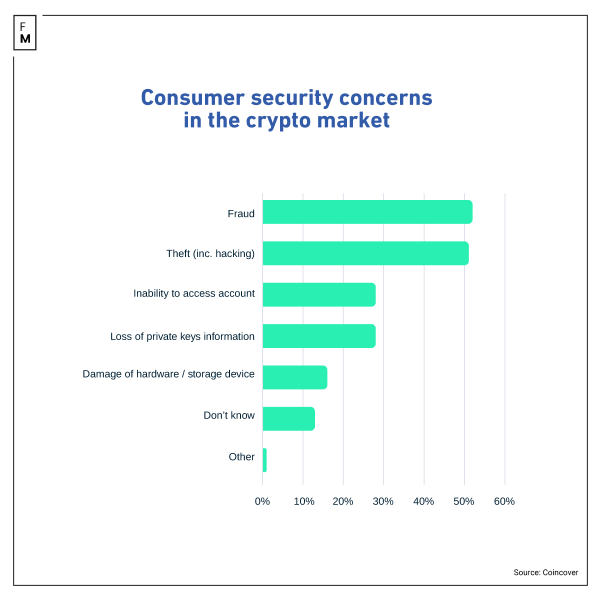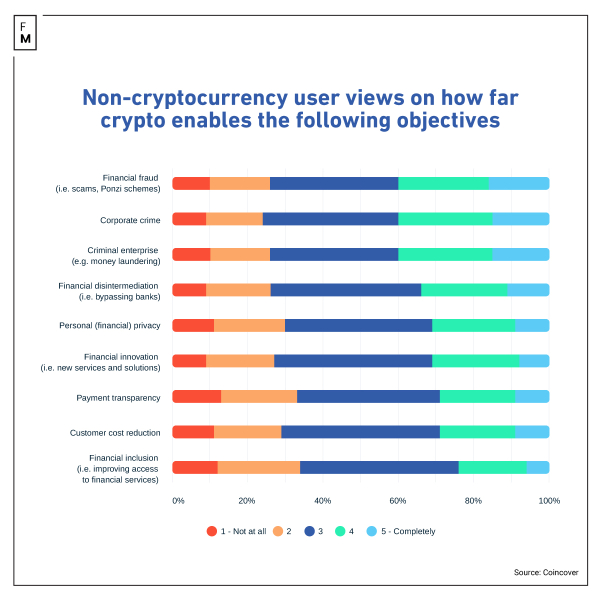Survey Unveils Volatility and Security Risks in Crypto Industry

More than 40% of cryptocurrency users have expressed skepticism about cryptocurrencies due to concerns about their volatility and financial risks, according to a survey by Coincover. Cryptocurrencies have faced various challenges and controversies over the years, which have contributed to a mixed reputation. According to a survey by Coincover, some of the key challenges facing the cryptocurrency industry when it comes to improving its reputation and achieving mass adoption.
Survey Findings and Insights: Influences on Crypto Reputation
The report identifies two major obstacles to the mass adoption of cryptocurrencies, volatility and security risks. These are longstanding concerns within the crypto industry that have contributed to a lack of confidence among potential users. The report’s findings are based on a substantial survey of over 16,000 people across nine countries.

The current reputation is likely influenced by factors, such as market volatility, high-profile security breaches, regulatory uncertainty, and the association of cryptocurrencies with illegal activities.
To address these challenges, the report suggests the implementation of voluntary industry standards. These standards would serve as guidelines for cryptocurrency providers to enhance security, transparency, and accountability in their operations.
Additionally, the report proposes mechanisms for users to identify providers that adhere to these standards, which could help build trust and confidence among consumers.
Ian Taylor, the Head of Crypto and Digital Assets at KPMG and the Board Advisor at CryptoUK, added: “Self-regulation is something that we’ve been working on as a global industry for a long time to support government entities, as well as international standard setters that develop the frameworks that get passed down to individual competent authorities. In a new industry, that’s the first stepping stone to providing codes of conduct for members, and a set of rules that protects against harm to clients.”
Encouraging users to move to recognized providers who adhere to industry standards could help establish a more secure and reliable ecosystem. This would provide users with a clear way to distinguish between reputable and potentially risky cryptocurrency services.
Cryptocurrency Preference: Bitcoin, NFTs, and Ethereum
The survey indicates that a significant portion of respondents (17%) already own cryptocurrencies and an even larger percentage (30%) are considering investing in cryptocurrencies in the next 12 months.
This suggests a growing interest and the potential for increased adoption in the near future. Among those surveyed, Bitcoin is the most popular cryptocurrency, with 46% of respondents owning or considering it. Non-Fungible Tokens (NFTs) come in second place at 18%, which is ahead of Ethereum at 17%.
This reflects the diversity of interests within the cryptocurrency space. More than half of the respondents (55%) have expressed some level of curiosity about cryptocurrencies, indicating a growing awareness and willingness to explore this emerging asset class.
Additionally, 11% of respondents consider themselves actively or highly invested in the market, suggesting a dedicated and engaged user base.
Positive Financial Returns in Cryptocurrency
A significant portion of respondents (50%) report positive financial returns from their cryptocurrency holdings. This positive sentiment regarding returns is likely to encourage more individuals to consider cryptocurrencies as an investment option.
Overall, these findings suggest that cryptocurrencies are gaining traction and becoming increasingly mainstream. The high level of curiosity and interest, combined with positive investment returns for many, could drive further adoption and investment in the cryptocurrency space.
David Janczewski, the CEO and Co-Founder at Coincover, said: “Crypto’s potential is huge, but our research makes clear that the industry must take steps to address consumer concerns. Many still perceive cryptocurrency as a mysterious technology and the industry must show that it is doing everything it can to protect investors, build consumer confidence, and provide stronger foundations for the future.”
It’s essential for individuals to approach cryptocurrency investments with caution, conduct thorough research, and be aware of the inherent risks associated with this asset class.
Consumer Cynicism towards Cryptocurrencies
The obstacles and concerns outlined in the data provided highlight some of the challenges that the cryptocurrency industry must address to achieve broader adoption and improve its reputation. A significant portion of consumers (19%) expressed cynicism about cryptocurrencies, while 25% are entirely closed off to the idea.

Trust remains a significant issue, with 30% of non-crypto users expressing a complete lack of trust in cryptocurrency exchanges. The collapse of FTX (a famous cryptocurrency exchange) has had a negative impact on the industry’s reputation.
Cryptocurrency’s Association with Criminal Activities
The perception of cryptocurrencies as enablers of criminal activities is a persistent concern. Price volatility and security concerns are identified as the top barriers to cryptocurrency investment. Concerns related to fraud and theft, including hacking, are significant worries for cryptocurrency: Only 54% of people who own cryptocurrency assets are satisfied with their providers’ commitment to security.

Addressing these obstacles and concerns will require collaborative effort from the cryptocurrency industry, regulators, and educational institutions. Stricter regulations, industry best practices, enhanced security measures, and educational initiatives can help build a more trustworthy and secure environment for cryptocurrency users and investors.
Janczewski, said: “The industry can do more to protect users and reduce risk. We must develop clear standards and adopt best working practice principles. By so doing, we can reduce security risks, prevent reputational damage, and help to build confidence among users. Organisations which adhere to standards will become easily identifiable, and force out untrustworthy entities.”
The report’s recommendations align with the broader industry trend of improving security and transparency within the cryptocurrency space. By addressing these concerns and implementing voluntary standards, the crypto industry may be able to gradually enhance its reputation and pave the way for broader adoption among both individual users and institutional investors. However, the success of such initiatives will depend on widespread industry cooperation and regulatory support.